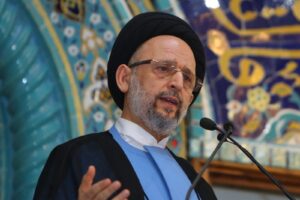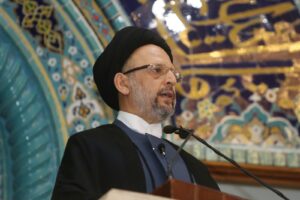The virtue of patience
His Eminence, Sayyed Ali Fadlullah, delivered the two Friday prayer sermons at the Imamain Al-Hassanain Mosque, Rabi Ath-Thani 5, 1442 H. /November 20, 2020 Several prominent religious scholars, dignitaries and believers attended the Jumu’a prayer. Following is the edited text of the sermons:
The first Sermon
Allah, The Most Exalted, says in His Glorious Book: Indeed in their stories, there is a lesson for men of understanding. It (the Quran) is not a forged statement but a confirmation of the Allah’s existing Books [the Taurat (Torah), the Injeel (Gospel) and other Scriptures of Allah] and a detailed explanation of everything and a guide and a Mercy for the people who believe. Allah, The Most Exalted, speaks the truth.
One of the stories the Quran narrated is the story of Prophet Ayoub, who is the prophet that gave us the most wonderful example of patience upon calamities, to the extent that his name was coupled with calamites and patience. And that there is no one who has been tried with tragedies that does not remember him or take him as his role model.
Today I would like to recall some of the aspects of this story to learn their lessons: Allah has blessed Prophet Ayoub with wealth, children, a good health and a strong body. But they disappeared all out of a sudden. He lost his wealth, his children died , he got sick with an illness that crippled him and his relatives and friends abandoned him. Despite all that he remained patient, mentioning Allah and satisfied with what He has written to him
. When he(a.s) was asked by his wife to call God to end his hardship, he asked her: ‘Tell me, how long did I enjoy good health and riches? ‘She replied: For eighty years’. Then he asked: ‘How long have I been suffering like this?’ ‘She said: For seven years’. Prophet Ayoub then told her: “In that case I am ashamed to call on my Lord to remove the hardships, for I have not suffered longer than the years of good health and plenty”.
But when things became so bad and he was suffering from poverty, isolation, illness and abandonment, Ayoub prayed to Allah. But in what manner did he do that? Was he begging or friendly blaming or even angry?
No, he was shy, for he was satisfied by describing his status: Indeed, adversity has touched me, and that of Allah and You are the most merciful of the merciful.” Thus, he was very polite when talking with his God and at the same time he was confident that Allah will continue to take care of him. That is why he did not ask Allah to cure him or to return his money, for he was full of trust in his Lord. Obviously Allah did not disappoint him and cured him with the water he ordered him to obtain Strike [the ground] with your foot; this is a [spring for] a cool bath and drink. Not only did this water cure him, but all his affairs returned to its previous state after he drank and bathed by this water. Allah says: Therefore We responded to him and took off what harm he had, and We gave him his family and the like of them with them: a mercy from Us and a reminder to the worshippers. Allah’s graces did not stop at that. He also gave him the medal of the patient, as He says: We found him patient, an excellent servant. Indeed, he was one repeatedly turning back [to Allah].
This story infers many lessons which we are going to point out to a few of them:
Testing or trials with adversities is one of Allah’s norms; just as life contains good health, it also contains sickness, , and just as it has wealth, it has poverty … This is what Allah pointed at when He said: And We will surely test you with something of fear and hunger and a loss of wealth and lives and fruits, but give good tidings to the patient.
Trials befall all people, even Prophets and Imams, and not only those who disobey Allah. It is not, as some might think, a Divine punishment for the sins one commits. The difference between one man and another lies in the way he deals with such trials. Some confront it with patience, and hope while others with despair and objection.
The second lesson is the need to resort to patience upon trial …Patience is the manifestation of belief. … One cannot be a believer if he does not accept what Allah has decreed and does not endure and persevere when tried. The Hadith says: Verily, patience is to faith as the head is to the body. If the head is cut, the body will perish. No doubt, there is no faith for one without patience. And: You will not be believers until you consider the ordeal as a bounty and ease as an affliction, for patience during an ordeal is greater than oblivion during ease.
Allah has enhanced the value of this virtue when He pointed out to the rewards that the patient earn: Glad tidings, then, to those who remain patient;
those who when any affliction smites them, they say: “Verily, we belong to Allah, and it is to Him that we are destined to return. Upon them will be the blessings and mercy of their Lord, and it is they who are rightly guided.
The third lesson is supplication: the believer should not forget his God when he is tried with distresses. Allah says: When My servants ask you about Me, [tell them that] I am indeed nearmost. I answer the supplicant’s call when he calls Me. So let them respond to Me, and let them have faith in Me.
This was the weapon of the prophetsand the guardians, and this is what we should resort to when tried or tested and when we face challenges …
We are in a dire need for these lessons and emulate this prophet in returning to God in times of calamites to be provided with strength and determination and to be among the patient who are not defeated by difficulties and challenges.
Praise be to the Lord of the worlds.
The Second Sermon
Worshippers of Allah: I advise you and I advise myself with what Allah advised His worshippers when He said: O you who do believe! Seek aid from patience and from prayer, verily, Allah is with the patient. Allah has called on the believers not to be defeated by trials, difficulties and challenges. They should hold fast and stay firm and seek help through patience and prayer which would provide them with tranquility, reassurance, determination and will power. By doing this they will be stronger and more capable of facing challenges.
We begin by Lebanon, where the crises are escalating on the economic, social, health and security levels, as well as due to the developments on the regional and international fronts. All this is taking place while the political parties continue to live in denial and carelessness. They do not find in all these crises what calls for speeding up the formation of a competent government to confront them and get the country out of the dark tunnel it has entered and earn the confidence of the Lebanese and the world.
This government is still in the freezer of these parties and held prisoner by the conditions and the conterconditions that are the result of the hegemony of their sectarian and personal interests, and it seems that it will not be released soon…
This does not mean that we are denying the role of the foreign parties and their responsibility in complicating things and putting the spoke in the wheels of forming the new government and denying the necessary aid until its terms are accepted and its red lines are respected.
It has become clear that we are suffering from has two dimensions: an internal one and a foreign one. Nevertheless, there are also some foreign powers that wish to see this country stable and to help it in overcoming its crises, provided that it helps itself and carries out with the reforms it ought to perform… Furthermore, we will continue to maintain that this country is able to resist and overcome all foreign pressures if its political parties decide to forego all their individual calculations and stop putting their stakes on these foreign pressures and unify their effort in the service of this country.
Previous and current experiences have shown that the outside powers will lead to the demands of the powerful internal forces in the end and only the weak would yield to the external conditions and allow them to interfere in their internal affairs.
In the meantime, the Lebanese are waiting for the results of the lockdown on the numbers of those infected with coronavirus. As we underscore the importance of continuing to carry out these measures to halt the spread of this pandemic, we would like also to emphasize that this does not mean that the state should turn its back to the effects of the lockdown on the economy and especially the poor classes and take the measures that will secure their decent living.
We will also continue to emphasize that the best means to confront this pandemic is to abide strictly by the protection and preventive measures. In this respect, we would like to appreciate the strictness of the security forces and the municipalities in implementing these measure, and call upon them to continue. We also hope that the tickets given to those who violate the prevention measures would be used to confront corona and not in other places.
As for the so called student dollar, we call on the state to shoulder its responsibility towards the thousands of students who are suffering because their parents are not able to buy dollars to send them to their children. The responsibles should not claim that they have done their duty by enacting the relevant law; they should also pass the mechanisms that pty it in practice.
Lastly, the media and the press and some responsibles come up every now and then with stories involving corruption, but the judiciary does not move to investigate them and find out the truth, to punish the guilty and acquit the innocent, so as not to use these accusations as tools in the game of politics.




